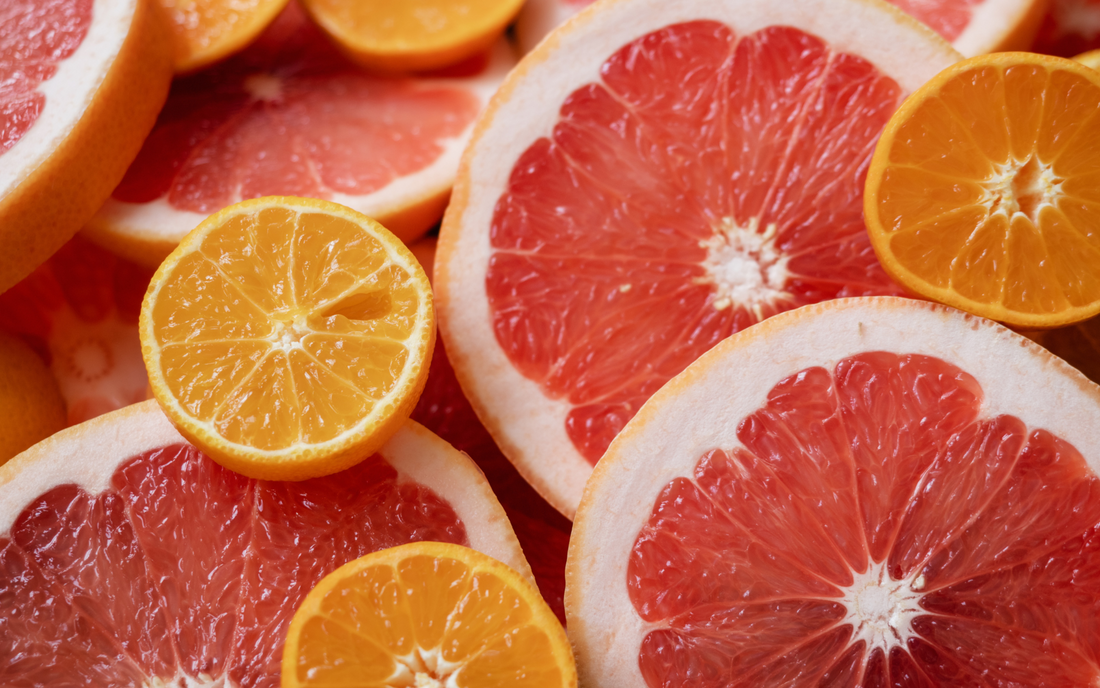I remember being super pregnant, two days before delivery with severely swollen feet and fingers, wearing my husbands oversized T-shirt while eating a date (in hopes I would prompt a afternoon delivery) thinking "man, I'm going to feel so much better when this little guy is out of me."
Little did I know the wave of changes postpartum would bring with little time to even think about what I was going through, let alone evaluate options that might help me.
I'm talking about severe night sweats leading to 3-4 clothing and bedding changes, hair loss, bone & body aches, feelings of isolation and just kind of bummed out moods, tiredness, constant hunger... and so many more!
While there are endless books on what to expect when you are ... expecting, there isn't a whole lot of information out there about what to expect for MOM after delivery.
Had I even had an inkling of things to come I would have spent the time researching and learning how I could easily have made my postpartum period smoother and gentler.
I would have learned that something as simple as supplementing- where key deficiencies were occurring- could make me feel worlds better.
Below is what I learned, and what made the biggest difference for me after I gave birth for a second time.
1. Vitamin D:
One of the most surprising feelings for me postpartum was how absolutely isolated I felt.
I was one of the lucky ones to get a decent amount of time off work after combining maternity leave with my vacation days, but I soon discovered how endless it felt.
When a baby is so small there isn't a whole lot going on in your day besides diaper changes and being food supply. Even if you have a strong group of friends ..they are at work.
I didn't have family close by, the days began to feel really endless. By 7pm when my husband came home I was often in tears, couped up and feeling lonely.
Combine this with seasonal weather changes and these feelings can really escalate.
One of the best things to improve this sort of bummed out melancholy mood is getting adequate Vitamin D3.
Correcting Vitamin D deficiency can significantly improve and aid in the recovery of postpartum depression and just feeling gloomy.
Moms can choose to have their Vitamin D levels tested and the majority will be recommended to take at least 2,000-3,000 IUS of vitamin D3 which is easily orally absorbed.
For moms who deliver in the winter months this really should always be a suggestion.
Even while living in warmer weather I found supplementing with vitamin D when postpartum with my second son made such a difference.
I take the Baby Blues Vitamin D3 Gummies which contain 2,000 IU of vitamin D3 per serving and the improvement in my mood and wanting to wake up for the day. It's the difference between just making it through the day and enjoying the day and it is 100% something I recommend to every new mom.

2. Magnesium
There are two things I really thought would go away postpartum that didn't. One was the muscle and leg cramps and the other was the bowel movements!
There's nothing quite like being in the throws of pregnancy and waking up because you have a Charlie horse in your leg. I swear I could just feel the vericose veins forming during pregnancy.
The tik tok craze of drinking a special magnesium drink out of a fancy martini glass penned the "girl mocktail" wasn't a thing back then.

But luckily in the last year we've made some strides and it seems like everyone is talking about magnesium.
So what is magnesium?
Magnesium is a mineral that plays a crucial role in the body function. It helps everything from blood pressure to bone strength.
Some of the best benefits of magnesium for new moms are:
- Improved sleep
- Muscle tension relief
- Bone health support (essential if you are breastfeeding)
- Relief of muscle and leg cramps
- Oh, and help with bowel movements that are especially difficult after just giving birth.
Whether you prefer it mixed in a drink and taken fancily before bed, or simply in pill form there are lots of options to add this to your routine and find some relief postpartum.
Dropping this magnesium it girl recipe, because- why not!
Ingredients:
1/2 cup plain tart cherry juice
4-6 ounces plain seltzer water
1 teaspoon magnesium supplement
Fresh mint, for garnish
Cherry, for garnish
How To:
Step 1:
Add cherry juice, seltzer, and magnesium into a cup with ice and stir well.
Step 2:
Garnish with mint + cherry
3. Biotin & Collagen- Postpartum Hair Vitamin
If I could go back and tell my 1st -time mom-self one supplement to take postpartum that would make the biggest difference for my self-confidence it would be start the postpartum hair vitamin right after delivery.
Even when you are armed with knowledge that postpartum hair loss is normal and due to hormones, it really won't help when you are looking in the mirror and seeing a receding hairline and thinning.
Because hair is the last place in the body to absorb nutrients, its especially important to start the supplements as early as you can. If there are any other deficiencies in your body they will receive the benefits.
Being able to take one supplement with a solid amount of biotin and collagen for hair growth is my best recommendation. Additionally you want supporting supplements in the vitamin to help with absorption.
I've found the baby blues postpartum hair vitamins to be the most effective and easiest to take. When it comes to a hair vitamin you want to be consistent over the period of the hair cycle (3 month minimum, with 6-9 months ideal) so you'll want to choose one that you really enjoy taking.

4. Iron:
Let's just say it. Postpartum women are susceptible to iron deficiency. When a mom lacks iron she can experience feelings of fatigue, dizzyness, and even heart palpitations.
This happens when red blood cells are not able to supply enough oxygen to the body.
Iron deficiency can have long-term health impact for mom and baby. Mothers with low iron during delivery and postpartum can experience altered cognition and even depressive symptoms.
For mothers who are breastfeeding, the need for iron is even greater. While low iron levels would make anyone feel extremely tired and fatigued- even grumpy and irritable - with poor concentration; when lactating these symptoms are exaggerated and heightened. Lack of sleep will also make any of these symptoms worse and this is extremely common postpartum.
You can ask your doctor provider to check your iron levels with a simple blood test and taking iron pills orally can significantly improve these symptoms.
I find that taking iron tends to back me up so I suggest taking them with vitamin c as the ability for iron to absorb greatly improves. When taking iron with excess not absorbing it can oxidize and cause gut irritation, resulting in side effects such as being constipated or nausea.

5. Probiotics
I admit I was in my 30's... ok late 30's... and knew nothing about the benefits of taking a daily probiotic.
It wasn't until I was struggling with discharge, and bloating, well beyond the postpartum period and seeing how that was affecting my mood- that I began down the rabbit hole of what could be wrong and how I could improve it.
Pregnancy and labor are both incredibly demanding on a mothers body. During just labor alone a woman can lose 10-20% of blood in her body.
Then comes the days and weeks following delivery where mom is literally putting herself together again while taking care of a newborn. There is a huge surge of hormones during this time to produce breast milk and regain strength lost during labor.
We mostly read stats on recorded postpartum depression cases which can be present in about 15% of new moms. however a shattering 85% of moms experience some sort of baby blues. If you had this abnormal feeling of sadness postpartum- this covers you.
Growing research published in the National Library of Medicine, is showing a direct correlation between the gut and brain axis and we are learning that a significant portion of postpartum mood can be attributed to a shift in the gut microbiomes of women following the trauma of labor and delivery and the hormone surge that comes with that.
A proper probiotic with restorative bacteria can make such a difference during this crucial time.
Probiotic & Breastfeeding:
Additionally, over 80% of moms attempt to breastfeed their babies for at least some period of time. Breastfeeding can take such a toll on a new mom and can be extremely dehydrating and draining.
A probiotic supplement while breastfeeding can be extremely important as it contains a proper mix of prebiotics (food for healthy bacteria) that helps mom produce milk that is rich in nutrients- mom may even be able to pass on bacteria that will reduce GI discomfort and skin issues by breastfeeding while taking a probiotic.
Bacterial Vaginosis:
Unfortunately many new moms experience tract infections postpartum (and even more following a c-section). Bacterial vaginosis is the leading cause of tract issues and vaginal ph inbalances.
Taking a probiotic postpartum can reduce the risk of these infections and just ease the recovery period for mom, making her more comfortable down there!
My probiotic pick:
I've had several mom friends experience skin issues with their infants, along with imbalances with their vaginal microbiome.
This is the kind of thing that really good friends talk about but I wish we were more transparent about.
I really believe taking my organic Baby Blues probiotic containing DE111 (Bacillus Subtilis), a clinically tested probiotic strain that is effective in improving gut health, provided my kids and I with some really important benefits that I wouldn't have had otherwise.

Moms who have just given birth, while a superhero in my mind, does still need a bit of help with nutrition and support for their healing and recovery.
I hope this blog shed some light on supplements that can help your postpartum recovery. Let me know in the comments any supplements you love that have made the experience that much easier!





